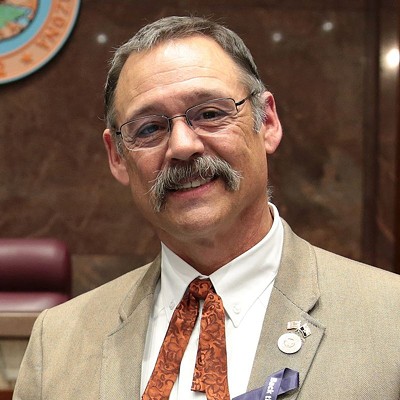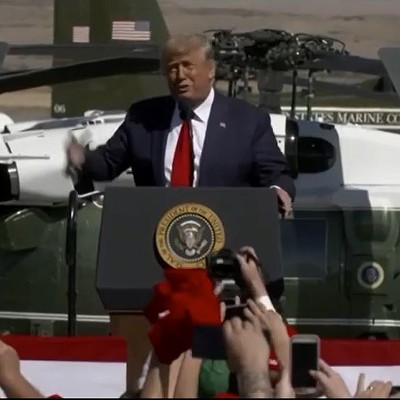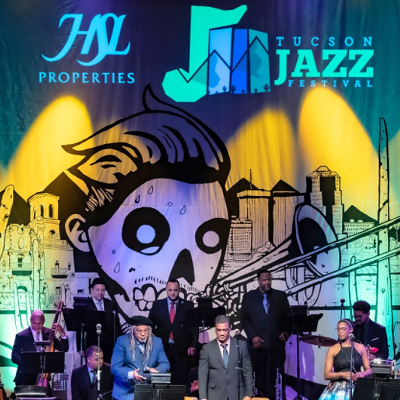Bands don't usually start
by picking names out of a hat.
But neither do bands tend to write their first songs and play their first show all on the same day.
In its third year, the Tucson Rock Lottery throws down the gauntlet on both accounts. A diverse group of 25 musicians get together—at the improbably hour of 9 a.m.—split into bands in a blind draw, then the five separate groups begin, from scratch.
The bands have the day to come up with names, write four original songs, learn one cover song, and then reconvene at the Flycatcher to perform. The event is a benefit for Tu Nidito Children and Family Services, a local organization that "provides comfort, hope and support for children and families whose lives have been impacted by a serious medical condition or death."
The forced creativity of a tight deadline and the uncertainty of performing in a different style or with previously unknown bandmates is the main draw of the event.
"I just want to do something scary. Excite me," says Louise Le Hir, one of the new performers in this year's event. "I want to see what happens when you don't know what you're doing. This town is really full of good musicians and I haven't played with a lot of them, so I want to play with people I don't know."
The first Tucson Rock Lottery took place in May 2011, says Justin Miller, the music booker at Flycatcher (then Plush). Mike Sanger (of Juarez and Dead Western Plains) brought the idea of the rock lottery, which the Good/Bad Art Collective began in Denton, Texas in 1997, to Miller, who organizes the event.
Miller, a member of ...music video?, ended up in what he calls "the most mismatched group ever." They nailed the band name—Larry King Live Presents Royal Wedding on Ice—but didn't find the collaboration easy going.
"We hated each other for about four hours and the after that, everything worked," he says. "We'd see each other on the street afterwards and always say 'Dude, we have to do that again.'"
So Miller brought the event back to Plush last year and plans to cement it as a highly anticipated annual event.
"It takes you out of your comfort zone and as musicians, anything that does that only makes you better," he says. "I want people to buy into the program and then get really fucked up, put electronic musicians who usually don't work with anyone else with mariachi musicians and death metal musicians."
Mik Garrison, a genre-bending multi-instrumentalist and horn player, participated in the first Rock Lottery and says he's "extraordinary excited" to be back for another round.
"It was a blast. I met a bunch of musicians I didn't even know I'd be disappointed if the band I got in wanted to play the type of music I normally play," he says. "It was awkward to begin with, but it was so much of a blur, it's almost as if it didn't happen. It was pretty madcap, non-stop."
Steven Romo, of the Electric Blankets and Ghostal, is another repeat performer. The first time, he had a few musicians in mind he was hoping to play with, but drew a band that was anything but.
"I picked the most off-spectrum group of people possible. How do I make a marimba, violin, acoustic guitar and violin work in my favor?" he says. "The roughest thing was the first hour and a half, when we were figuring out how to mesh together and what everybody could and couldn't do. I think everybody says that in unison in their own practice room: 'So, what do you want to play?'"
"I came out of the Rock Lottery looking at my drums in a different way. I was forced to play a style of music I don't think anyone had ever heard before," he says. "I'm a lumberjack. Everything is heavy and loud and I had to remember the other musicians around me. It gave me the confidence to play with other people on the fly."
Robert Hanshaw, of Sun Bones, says he's looking forward to shaking things up with some new musicians.
"I'm really used to being a sideman, so I'm easy. I'm excited to adopt to other people's ideas," he says. "I came up through jazz and bluegrass simultaneously with rock and I'm in different bands, so I'm excited to see whatever new combination gets thrown at me. I'm happy to meet it."
Adam Nixon, a singer-songwriter who performs solo, says he's looking forward to the songwriting challenge.
"I've occasionally come up with finished songs in like 45 minutes, but more often, it's months and months of working, so it'll definitely be a different approach," he says.
Having volunteered for Tu Nidito adds an extra bit of significance for Nixon.
"As a performer, it's way easier to get energized and encourage people to come to something you believe in, something that is worthwhile," he says.
Despite the pairing of possibly unknown musicians, in potentially ill-fitting combinations, everyone has high expectations.
"A lot of the best songs that have ever been written are the simplest ones," Le Hir says. "Finding a way to make a song with people you don't know seems complicated, but if you can make it simple, you can come up with something really great."
Tucson Rock Lottery
9 p.m., Saturday, Nov. 15
Flycatcher, 340 E. Sixth St.
$10 suggested donation to benefit Tu Nidito
798-1298;










